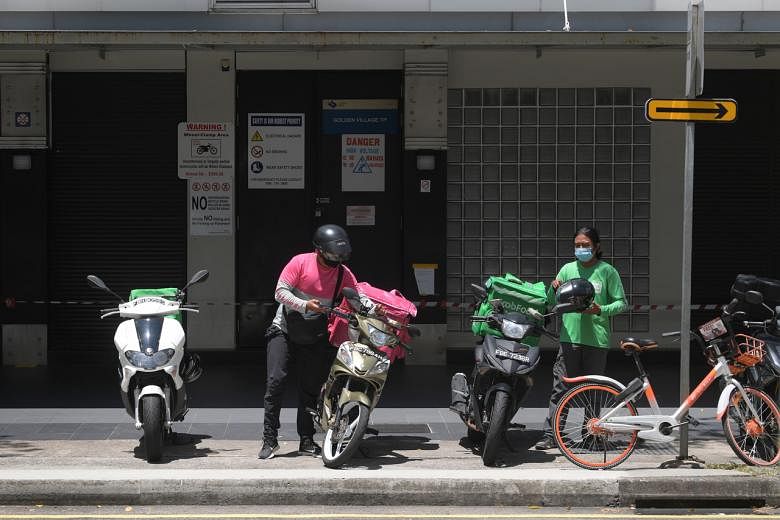SINGAPORE - Minority groups, vulnerable communities and green sectors of the economy should see greater representation in the Emerging Stronger Taskforce, which will guide Singapore's economic recovery post-Covid-19.
This was the thrust of an open letter signed by more than 45 individuals, some of whom represent not-for-profit organisations, social enterprises and arts groups, that was submitted to the Government on Monday (June 15).
The pandemic has highlighted vulnerabilities in society and economy, said the writers. They include Nominated Members of Parliament Anthea Ong and Walter Theseira and representatives from Artsolute, the Nature Society (Singapore) and the Disabled People's Association, among others.
Those who have been most affected by the coronavirus outbreak should be included in rebuilding a Singapore that can better withstand future shocks, the writers argued.
Like many governments around the world that are reassessing economic models, Singapore, too, should focus on creating jobs in sectors that can reduce the impact of climate change, they said.
The 17-member Emerging Stronger task force was announced by the Ministry of Trade and Industry (MTI) on May 6.
Led by Minister for Social and Family Development and Second Minister for National Development Desmond Lee, as well as Mr Tan Chong Meng, group chief executive of port operator PSA, the task force will work with stakeholders to drive industry transformation strategies in an economic landscape massively impacted by Covid-19, both globally and in Singapore.
Representatives from the technology, banking, property, agri-business, aviation and petrochemical sectors are included in the task force.
But the signatories of the open letter said the task force did not have adequate representation from the rest of Singapore society.
They acknowledged that while the task force had said it would consult with other segments of the community, it was important to have members concerned about vulnerable communities and climate change formally on board, to raise and debate issues on an equal footing.
Said Ms Tok Xinying, co-founder of environmental group Climate Conversations and lead author of the letter: "Coming out of the Covid-19 crisis, where we saw many groups and individuals step up, the letter's signatories collectively expressed a hope for continued active citizenry and a formal integration of societal concerns into future economic planning."
To this purpose, the writers suggested that the task force membership be expanded to ensure at least one representative from the social sector who is formally supported by an advisory council of non-profits, charities and academics, and at least one more climate-friendly business.
The task force should also include vulnerable economic players, such as gig economy workers, social enterprises and those who are self-employed, they said.
MINORITY AND VULNERABLE COMMUNITIES
Covid-19 has disproportionately hurt underprivileged groups and under-represented sectors. Systemic shifts arising from Covid-19 should be assessed to see how these communities could be safeguarded, said the authors.
For example, how can essential workers be safely and fairly compensated during times of crisis? Or what help can be given to those from lower-income brackets and the elderly to ensure they are not left behind as Singapore society digitalises?
The writers said the government budgets that have been rolled out to help tide Singapore through the crisis had recognised the importance of taking care of the vulnerable.
Last month, the Government had acknowledged that charities and social service agencies were facing difficulties and announced that two fund-raising programmes under the Tote Board and the National Council of Social Service will get top-ups to help the social sector tide over the coronavirus pandemic.
Ms Margaret Thomas, president of women's rights group Association of Women for Action and Research (Aware) and one of the letter's signatories, said that emerging stronger also means an economy with more room for local enterprises to thrive and a society with more comprehensive social safety nets.
She said: "One way to ensure this is for the task force to have at its table the voices of those who have been the most vulnerable during the Covid-19 crisis - women, older Singaporeans, the disabled, workers in the gig economy, small and medium enterprises."
Moreover, a future for Singapore should also be envisioned by a task force that is made up of the cultural, gender and demographic diversity of the nation, the writers said.
The participation of more women, minority groups, active elders, and those with disabilities should be ensured.
PROTECTING THE CLIMATE
The Covid-19 pandemic has brought the global economy to a near-halt.
But as governments around the world pledge funds to reboot their economies, calls are heard to use the sums to drive advances in cleaner technologies, create new industries and jobs, cut air pollution and curb the threat from climate change.
In noting the presence of representatives from the petrochemical and aviation sectors - major contributors of greenhouse gases - on the task force, the writers said that Singapore's continued reliance on such carbon-intensive industries would expose it to the "inherently volatile nature of fossil-based commodities".
Following travel restrictions and the decline of broader economic activity, the barrel price of benchmark United States oil plunged below zero dollars on April 20 for the first time in history, crashing 300 per cent from US$17.85 a barrel to minus US$37.63.
This drop may prompt a major rethink in national energy strategies, international observers have said. The World Economic Forum noted the importance of a "diversified, secure and reliable energy system that will ultimately support the future growth of the world economy in a sustainable and equitable way".
Mr Ho Xiang Tian, co-founder of environmental site LepakInSG, said a climate crisis looms behind the Covid-19 pandemic.
"As we recover from the impacts of Covid-19, it is an opportunity to restructure the economy to one that leads to a more equitable society and stable climate for Singapore and the world," he said.
"The Emerging Stronger task force must include leaders in the circular economy, environmental protection, and low carbon sectors to ensure that we don't go out of the Covid-19 frying pan into the climate crisis fire."












